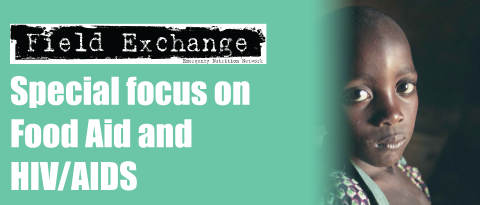Rethinking Food Aid in the Face of HIV/AIDS
Summary of published paper1
A recent detailed review of the relevant literature and the findings of a mission to eastern and southern Africa highlights the implications of the HIV/AIDS pandemic for food aid strategy and programming. The review examines experiences of using food aid within the context of Prevention of Mother to Child transmission (PMTCT) programmes, food supplementation in home based care, supplementary feeding for orphans and vulnerable children, food for education and training, food for work, and income generating activities and micro-credit schemes. A number of conclusions are drawn.
HIV/AIDS demands a multi-pronged response, grounded in an understanding of the susceptibility and vulnerability of people's livelihoods. Food aid can strengthen care, mitigation and prevention activities. It is also relevant for the nutritional well being of vulnerable groups and for strengthening human capital, as well as for preserving assets and livelihoods. Food aid can enable the marginalised to take advantage of development opportunities. Those affected by HIV/AIDS are arguably among the most marginalised populations, both socially and economically. Not only does stigma foster exclusion, but progressive asset depletion may also render households destitute and unable to participate in the development process. There are opportunities for using food aid to enable these populations to avoid and escape such marginalisation. In addition, it will be important to seek opportunities for linking such initiatives to HIV-specific interventions wherever possible, thus potentially further reducing susceptibility to HIV.
But many challenges exist which will need to be dealt with dynamically through ongoing implementation, good monitoring, and timely focused operational research. Such challenges include how to target the vulnerable in the HIV/AIDS context, how to use food aid to leverage longer-term livelihood options, how to ensure complementary resources through appropriate partnerships and how to strengthen local capacity. Donor responses have been piecemeal to date, and the involvement of food aid organisations is fairly recent. The article concludes that, "there is little empirical evidence regarding the effectiveness of food aid in responding to HIV/AIDS currently, this should not forestall action. A well documented learning-by-doing approach is required, of building up, evaluating and disseminating experiences and lessons learned".
1Kadiyala S and Gillespie S (2004). Rethinking food aid to fight AIDS. Food and Nutrition Bulletin, vol 25, no 3, pp 271-282
Imported from FEX website


